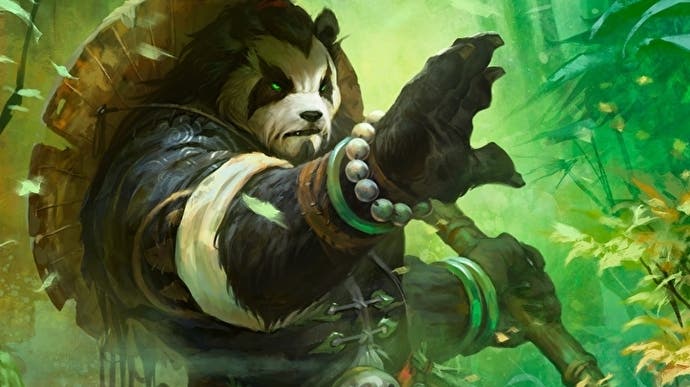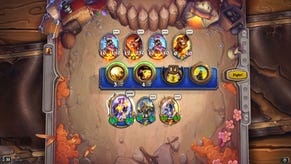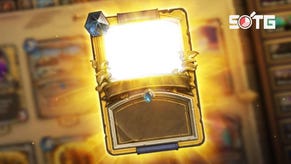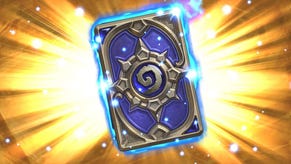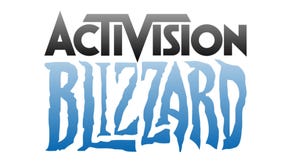Blizzard faces an impossible choice, but choose it must
The uproar over the banning of a Hong Kong Hearthstone pro threatens the company's values and identity to the core.
It's a little less than a year since BlizzCon 2018 went wrong. To cap off the opening ceremony for its annual fan event, Blizzard unveiled a new smartphone game called Diablo Immortal, co-developed with Chinese company NetEase. Fans from Blizzard's Western, PC gaming heartlands weren't slow to voice their displeasure online - or, embarrassingly, at the event itself, during Q&A sessions with developers. This wasn't the Diablo game they wanted. It wasn't for them.
The unveiling was a PR disaster - a predictable and avoidable PR disaster - at a difficult time. Much loved, player-focused founder Mike Morhaime had just stepped aside as president. A few months later, the studio would make widespread layoffs in tandem with - or as some suspected, dictated by - its more commercially ruthless merger partner Activision. Fans' sense of entitlement went hand-in-hand with a not unfounded anxiety that their favourite developer might be losing the plot.
Since then, Blizzard made the most of a surge of nostalgic goodwill around the launch of World of Warcraft Classic - a literal fan service - and laid careful plans for a charm offensive at this year's BlizzCon. If the event went well, it would put Blizzard's reputation with players back on track.
Yet now, with BlizzCon 2019 just two weeks away, all that work is at risk of being overshadowed by another fan backlash. Once again, the controversy has its roots in Blizzard's attempt to straddle the Chinese and the Western markets, but this time it is far, far more serious and potentially damaging.
Two weeks ago, Chung "Bltizchung" Ng Wai, a Hearthstone pro player from Hong Kong participating in Blizzard's official Grandmasters series, made a statement in support of the city's pro-democracy protesters during a post-match interview. He was swiftly banned from competition for a year and lost all his prize money. Inexplicably, Blizzard also banned the two casters who interviewed him. It then remained silent for a week as a tumult of anger and disquiet over the decision built online.
Blizzard was called an enemy of freedom of speech and accused of putting profit before values. A boycott movement started, with many deleting their Blizzard accounts, and even Blizzard staff protested. Tellingly, this has been one of very few gaming controversies with a social and political dimension to unite both liberal and reactionary groups of players.
When Blizzard eventually did comment, late on the Friday, it relented a little, halving the bans to six months and restoring Blitzchung's prize money. But it doubled down on its position that his statement breached competition rules and the casters had failed to stop him - and insisted that "our relationships in China had no influence on our decision." (By contrast, NetEase, Blizzard's partner in China, issued a statement with a patriotic, arguably pro-government tone.)
But no decision is made out of context, and boy is there some context to deal with here. As tensions run high in Hong Kong and the Chinese government seeks to stamp out not just dissent but the appearance of dissent, Blizzard's move of course appeared to support the censorship policies of an anti-democratic regime.
The Chinese gaming market is enormous, yet poses serious challenges to any Western publisher. There is stringent censorship and regulation and all games need a Chinese company to act as operator. Blizzard has a longer history in China than most. Its games have always been well suited to the PC café culture there, and it worked hard to gain an early foothold. World of Warcraft was a huge hit in this MMO-mad market, but its early years were troubled: there was a change of local operator and regulatory approval for the expansions took forever. Wrath of the Lich King came out almost two years after its Western release. After a lot of work, a plan to make the Pandaren - a race of anthropomorphic pandas - one of the two new playable races in first expansion The Burning Crusade was scrapped over fears they would cause offence to Chinese players or regulators.
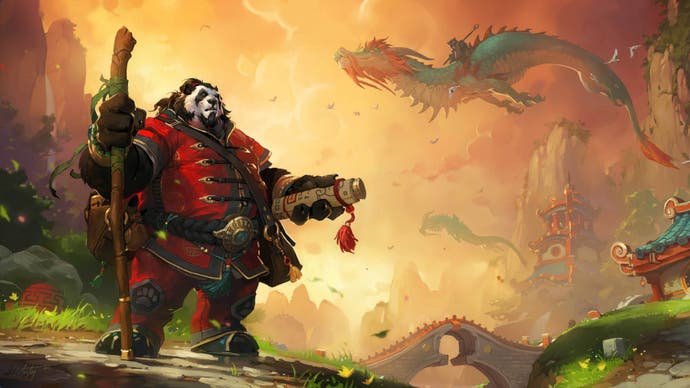
The Pandaren did finally appear in 2012 in Mists of Pandaria, an expansion themed almost exclusively - and with lavish attention to detail - around Chinese culture and folklore. It was a transparent love letter. Unlike WOW's broad-brush stabs at everything from Nordic myth to Jules Verne and H P Lovecraft, Mists of Pandaria's tone was studious and reverent. The Pandaren, presented as a wise and serenely balanced people, remain the only player race in the game able to join either the Horde or the Alliance faction. They exist at one remove from the squabbling mess of Azerothian politics. Mists of Pandaria sailed through the approval process in China and was the first WOW expansion to be available there day-and-date with the rest of the world.
So Blizzard is deeply invested in China - not just financially, but creatively and emotionally. Its games entertain many millions of Chinese people. Its services in the country make a big contribution to its bottom line. And all of this exists at the whim of the Communist Party of China, which not only has total control of government but which extends its influence deep into Chinese businesses, including NetEase and Tencent, which has a five per cent stake in Activision Blizzard (along with dozens of other prominent gaming companies). If it so wished, the Chinese government could use its regulators to turn off Blizzard's games like a tap.
Blizzard is hardly alone in this situation. Almost every facet of Western big business is so invested in China that the Chinese government exerts an outsize influence on it. Entertainment and media businesses, with their power to shape the perception of China in the global consciousness, get particular attention. Hollywood studios now routinely self-censor their output to ensure they get a clear run at the Chinese box office. The National Basketball Association has been embroiled in a parallel controversy to Blizzard's centred on the suppression of a tweet by a team manager in support of the Hong Kong protests. These companies' corporate self-interest compels them to bend to the will of the Chinese regime, even when it runs counter to their own values. (The NBA is famously the most progressive US sports league.) Republican US Senator Marco Rubio (of all people) put it most succinctly on Twitter: "Recognize what's happening here. People who don't live in China must either self censor or face dismissal & suspensions. China using access to market as leverage to crush free speech globally."
For Blizzard and others like it, it's an impossible choice. Betray your values, or say goodbye to a billion-dollar market and betray your shareholders. (As well as, it's fair to say, your blameless Chinese customers.) In a capitalist world, shareholders win every argument.
Mei the Force be with Hong Kong from r/HongKong
[Some angry fans are mounting a kind of hostile takeover of Blizzard's intellectual property by trying to turn Chinese Overwatch character Mei into a Hong Kong protest symbol - as seen in the above Reddit embed. The hope is that it will sour Chinese authorities on the game and get it banned.]
The defence first offered by the NBA in the 90s and now echoed by Blizzard and its peers is that they provide a safe, politics-free space for people from different cultures to come together and enjoy the same things. (In the Blizzard statement, president J Allen Brack made repeated references to the company's mission "to bring the world together through epic entertainment"; Riot Games - maker of League of Legends, owned by Tencent - made the same argument in the wake of the controversy.) It's a convenient line, with billions at stake, but it doesn't have to be a cynical one. There is value to humans finding shared fun in the same things - perhaps now more than ever.
But Blizzard's statement hardly seems to have put the issue to rest, and the memory of its long week of silence remains unnerving. It doesn't suggest a company with moral confidence in its position. It suggests a company paralysed by the situation it has found itself in. As one employee told Vice before the statement had been made: "We're damned if we don't take a stand - we'll have lost a lot of support from fans outside of China. We're damned if we do - you can't keep the lights on when we lose income from China and others more hungry swoop in to take our place. Even if I did leave, where would I go that's not beholden to access or income from China today or tomorrow?"
Faced with this impossible choice, Blizzard resorted to the rulebook. But rules seldom beat values. The rage and disappointment among fans, observers and Blizzard's own staff is real and lasting. Battening down the hatches and riding it out is not going to work; this isn't Diablo Immortal. It's not about the account cancellations, which could never hope to tip the scales of risk when there's a nation of 1.4 billion people on the other side. But it is about a battle for Blizzard's values, its identity, its soul. It will lose talent over this. It will lose loyalty. It will lose respect. More incidents like this will inevitably follow and Blizzard will, by increments, become a smaller company, a meaner one, a company that has lost touch with its sense of purpose. Eventually, the games will suffer. They will be less good, and players will desert them not for some ideological cause, but because they won't be as much fun any more. The magic will have gone.
Now that is a risk that can sit on the other side of those scales and balance them - maybe even tip them. That is something that should make Blizzard management stop and think about what value really is, and what rules really mean, and perhaps make a hard decision.
It's a decision the NBA, in even more pressured circumstances, has managed to make. League commissioner Adam Silver, suffering intense criticism from both China and the US over the team manager's deleted tweet, made a statement firmly supporting the freedom of NBA players and team members to speak out. Silver has since revealed that he batted away Chinese requests to have the team manager fired. NBA games are off the air in China while teams and players are losing huge sums in sponsorship; Silver said the financial consequences for the league are "fairly dramatic". But, he said, "the values of the NBA - the American values, we are an American business - travel with us wherever we go. And one of those values is free expression."
The NBA has been in China longer than Blizzard, Riot, any Western video games company. The scale of its investment and the financial consequences of it breaking with the government dwarf those for Blizzard. And yet, after a brief wobble, it has placed its values first, because the alternative - losing its very identity - would be even worse.
This issue isn't going away. The gaming world looks to Blizzard for leadership. It has two weeks until BlizzCon to find its courage.
